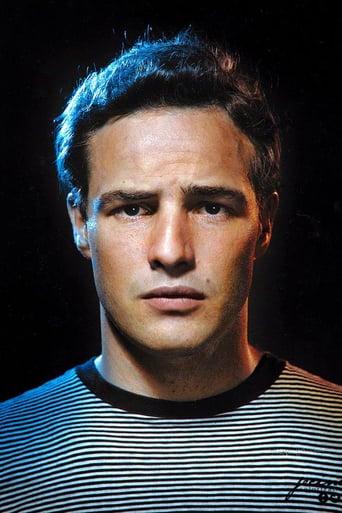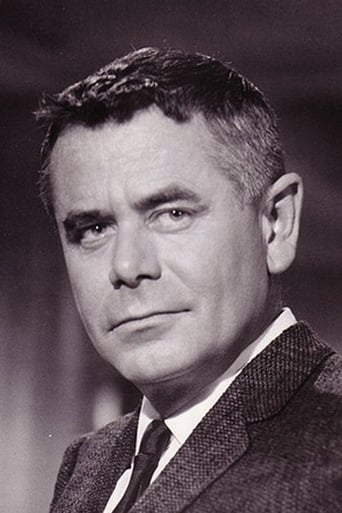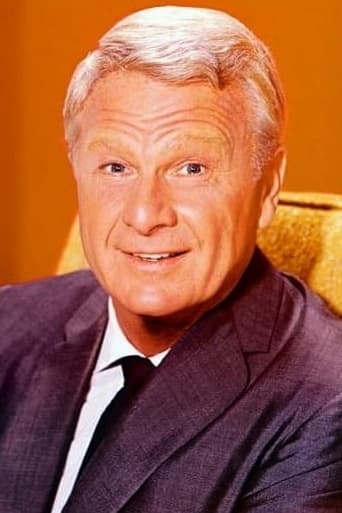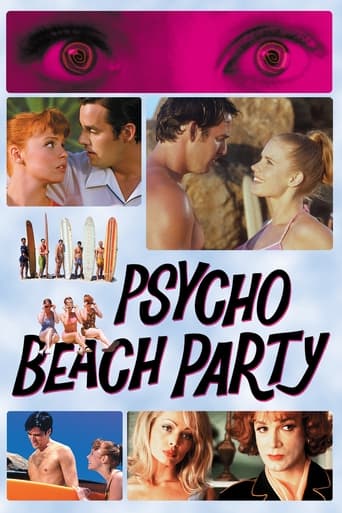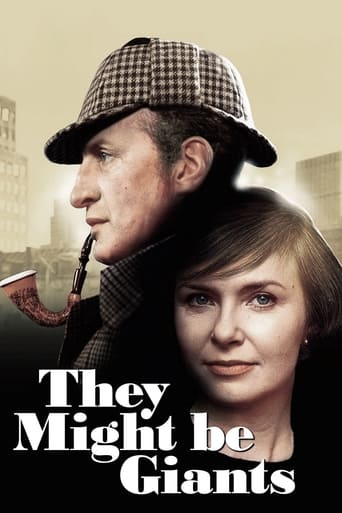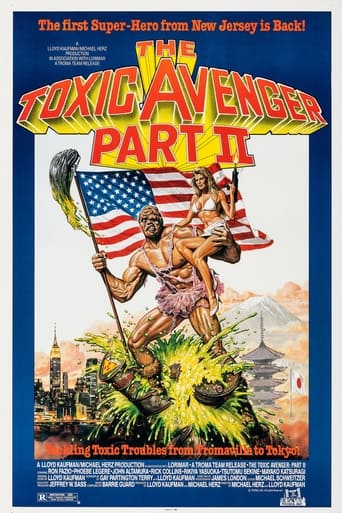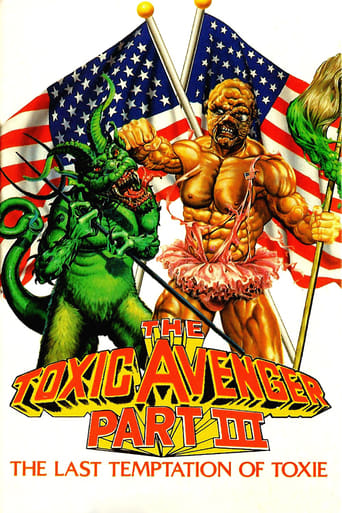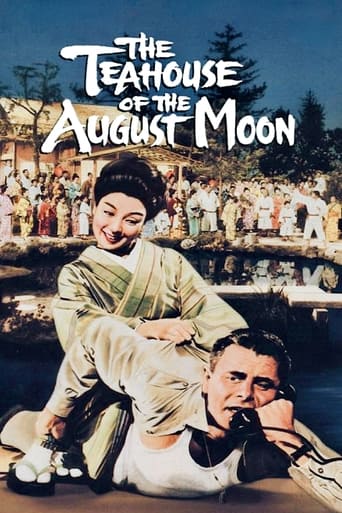
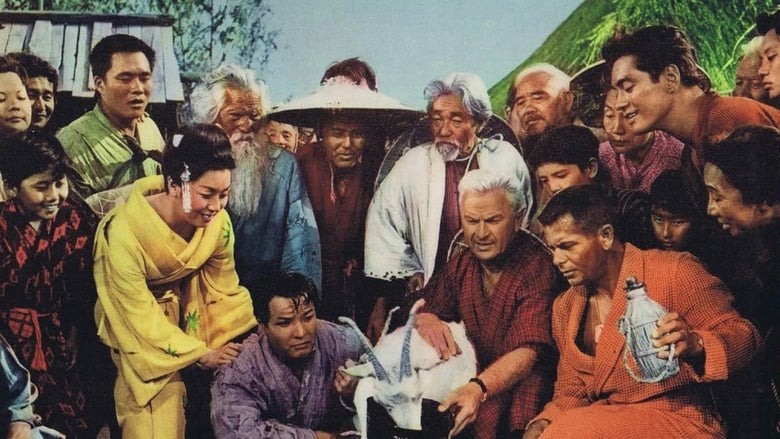
The Teahouse of the August Moon (1957)
In post-WWII Japan, an American captain is brought in to help build a school, but the locals want a teahouse instead.
Watch Trailer
Cast


Similar titles
Reviews
After winning World War II, the United States sends enthusiastic Glenn Ford (as Captain Fisby) to Okinawa, Japan. His mission is to build a schoolhouse and turn the local Japanese people into an Americanized Democracy. Translating for Mr. Ford is savvy Asian-mannered Marlon Brando (as Sakini). He doubles as our host. Trouble is, the locals don't want a schoolhouse shaped like the US Pentagon. They want the Americans to build them a traditional teahouse, instead, with geisha girls like beautiful Machiko Kyo (as Lotus Blossom). Comedy results from the Americans unexpectedly succumbing to Japanese culture...Director Daniel Mann enjoyed much success bringing stage dramas to the motion picture screen, but was less successful with comedy...This one may dip due to the lack of bigger comedians in the roles, but Marlon Brando and Glenn Ford are closer to original Broadway players David Wayne and John Forsythe than they would be to Jerry Lewis and Dean Martin. Brando likely saw a kindred spirit in Mr. Mann. His make-up is too obvious, but Brando could hardly have played the part by squinting and faking an overbite. The method actor impersonates an Asian man without offending, but hindsight unmasks his endeavor as a distraction. The sly humor works, but scenes go on too long without amusing; most of this material should be shorter and snappier on film.***** The Teahouse of the August Moon (11/20/56) Daniel Mann ~ Marlon Brando, Glenn Ford, Eddie Albert, Paul Ford
This film made me realize how much we've lost as a country since the 1950s. According to Wikipedia at least, the book, play, and film were enormously popular for about 25 years, when political correctness set in, and liberals were oh-so-terribly aghast at Marlon Brando playing an Okinawan with a heavy accent. But it's Brando's character who is the most admirable in the movie -- sharp, perceptive, and cunning, but also warm, generous, and forgiving.All told, it's the Okinawans who come off well -- it is we Americans who seem rather ridiculous, with our notions of winning hearts and minds and spreading democracy. Remember that this film was made just ten years after WWII, when we were up against the Soviet Union, and democracy and "the American way" were at the heart of what we thought we were all about. But here is a film that completely satirizes, if not ridicules, all that, and yet it was enormously popular. Perhaps I'm looking at it through rose-tinted lenses -- there may well have been the Michael Savages and Rush Limbaughs of the day who inveighed against the Hollywood liberals seeking to undermine American resolve in the face of the Soviet threat and disgracing the memory of those who had died in WWII. But I think, more accurately, it was a time of greater American self- confidence, when we were able to laugh at ourselves more easily, and weren't terrified that this, that or another group might be ticked off. In short, this is a wise movie that should be seen by all those in power who have anything to do with how we conduct ourselves toward other nations and peoples -- as well as anyone who wants to see an entertaining but also educational film.
Adaptation of John Patrick's play about American soldier trying to teach Democracy to the Japanese in 1946 Okinawa. One-joke material about cultural assimilation isn't exactly politically-correct when seen today, but were these stale, frantic jokes ever amusing? Marlon Brando's performance as an Oriental interpreter has to be seen to be believed; he's lively, yes, but there's a concerted effort to make him appear clownish (this couldn't have been Brando winging it--director Daniel Mann must assume part of the blame). This silly story never gains any momentum, and the slapstick hijinks are broad but stilted (they have a mechanical feel which, again, should be attributed to the direction). Glenn Ford, Paul Ford and Eddie Albert are solid as always, but they get swallowed up in this unfunny facade. *1/2 from ****
Obviously, nowadays it makes us cringe that Marlon Brando plays a Japanese person, but "The Teahouse of the August Moon" is still a laugh riot. After WWII has ended, Capt. Fisby (Glenn Ford) is hired to spread democracy to an Okinawa village and build a school. But the townsfolk want a teahouse, and to convince him they even give him a present: a hot, over-enthusiastic geisha named Lotus Blossom (Machiko Kyo). When Fisby's superiors learn what's been going on, they naturally aren't pleased."TTOTAM" remains a comedy classic, especially with some of the dialogue between Fisby and his superiors ("I want to make sure that everything's distributed equally." "That's communism!"). How people come up with these wacky situations remains a mystery to me, but they did it with hilarious results. And above all, this movie shows us the problems with trying to spread democracy too quickly (Bush & Co. could learn something from this, given the mess that we've made in Iraq).


